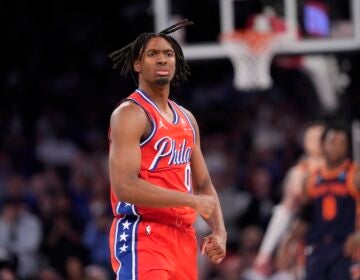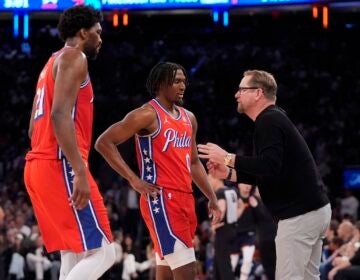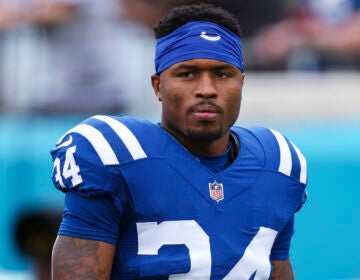Kenney scores resounding victory; Council will get new faces [video]

Jim Kenney accepts the Democratic Mayoral nomination Tuesday night. (Kimberly Paynter/WHYY)
Jim Kenney, who started his Philadelphia mayoral campaign late, wrapped up a resounding victory amazingly early on Tuesday night.
Kenney, who resigned from Council in January to launch his bid, will be heavily favored over Republican candidate Melissa Murray Bailey in November’s general election. Democrats hold roughly a 7 to 1 registration edge over Republicans in the city.
What Kenney said
In his victory speech, the 56-year-old from South Philadelphia thanked his parents, teachers, former peers and staffers in City Council, campaign staff, children and the “broad and unprecedented coalition of diverse groups” which backed his campaign.
“People of every neighborhood all came together behind this effort,” he said. “Make no mistake, it was that unity that made us victorious. We could not have accomplished so much in such a short time without all of us working together.”
Citing the city’s challenges — “underfunded public schools, poverty, a strained relationship between community and police” — Kenney said he hoped people would unite to fight for “universal pre-k, community schools, a real living wage, the end of stop-and-frisk and giving every working family to the opportunity to succeed, no matter what neighborhood they live in.”
Kenney scored nearly 56 percent of the vote, more than doubling the tally of state Sen. Anthony Hardy Williams, who was once considered the race’s front runner.
With 98 percent of the vote counted, Williams totaled just over 26 percent of the vote with Lynne Abraham (8.4 percent), Doug Oliver (4.25), Nelson Diaz (3.7) and Milton Street (1.7) rounding out the field.
Reax from competitors
In his concession speech, Williams said:
When we started this journey the schools needed fixing and they still need fixing; people needed jobs and they still need jobs; the culture of the Philadelphia police department still has to change. While the campaign ends, the journey continues.
There is a child in a public school who feels this moment.
There is a person returning from college and a person returning from prison who are both looking for jobs.
There is a young person who wants to walk in safety in his neighborhood and be respected by the person who protects him.
Our campaign has been about building “One Philadelphia.” A city where everyone has an opportunity for a great education, a job with a future, and the chance to live safely and without fear, no matter what neighborhood you live in. A world-class city that truly lives up to its promise.
You need to know that I will continue to lead on these issues, because they matter to our future as a city.
Together, we can continue to work for One Philadelphia, a city that lifts up every citizen in every part of our beautiful city.
Lynne Abraham waited out results that probably mark an end to her political career with about 100 supporters at a bar in Old City.
Without a broad coalition of major backers, and with only limited television ad time, Abraham only garnered 8 percent of the vote.
“I want you to know that I’m not sad at all,” she said during her concession speech before about 100 supporters at an Old City bar. “I’m thrilled to have been in the ring.”
For his part, Doug Oliver, who received much more favorable voter reaction during his longshot campaign than his vote total might indicate, said, “I already know I have a groundswell of support. I don’t know if it’s political office. I do know I’m well-equipped because of every single person here.”
Abraham, the only woman running for mayor in the Democratic primary, lamented that the campaign didn’t focus more on issues that particularly affect women and the elderly: “If this was a wake-up call for women, this will be a great campaign.”
Foes (definite and possible) chime in
In an email to NinetyNine late Tuesday night, Murray Bailey congratulated Kenney “for running a campaign that resonated with Democratic voters.”
“I look forward to debating the issues and demonstrating to voters that I am the candidate with a vision for a better Philadelphia,” said Murray Bailey, who was photographed Tuesday afternoon with her arm around Kenney at a recreation center and left him Kenney a congratulatory voicemail. “That vision includes a Philadelphia that grows jobs and a public school system that keeps families in the city.
Meanwhile, former City Councilman Bill Green, who was in the hotel room as Williams got the bad news that he was defeated soundly, ran down how he would make a case against Kenney as the next mayor if he decided to run in the fall as an independent..
“Nobody went negative early with his 35 years in city politics. Forty-three percent of the city population think the city is on the wrong track,” Green said. “If you have been part of the system for 35 years, it’s hard to believe if the populace understood that they would think that you would put the city on the right track.”
Green, now a member of the School Reform Commission, also said Kenney lacks a coherent education policy.
Talking on WHYY’s election-night special, Green, who changed his registration to independent earlier this year, said it was soon for him to say whether he’d challenge Kenney, but he did not explicitly rule it out.
At-large results
With many projecting a big Kenney victory, the biggest local shake-up on primary night came through the Democratic Council at-large race.
If the results hold through the general election, incumbents Ed Neilson and W. Wilson Goode Jr. will not return to council in 2016. Challengers Derek Green, Allan Domb and Helen Gym will join the 17-member legislative body. (Incumbents Bill Greenlee and Blondell Reynolds Brown retained their seats.)
On the Republican at-large side of things, incumbents David Oh and Dennis O’Brien finished first and second respectively in the seven-candidate field. In November, they will have to fend off three Republican challengers to grab the two council seats reserved by the City Charter for minority-party representatives.
District-council results
Incumbent Councilman Kenyatta Johnson (Second District) and Councilwoman Maria Quinones Sanchez (Seventh) fended off challengers in their oft-heated races.
With 97 percent of the vote counted, Johnson defeated challenger Ori Feibush by a shade under 6,000 votes (62.67 to 37.29 percent).
Quinones Sanchez defeated embattled challenger Manny Morales by considerably fewer votes. With a shade under 98 percent of the vote counted, Quinones Sanchez by roughly 900 votes (53.7 to 46.2 percent).
WHYY is your source for fact-based, in-depth journalism and information. As a nonprofit organization, we rely on financial support from readers like you. Please give today.




